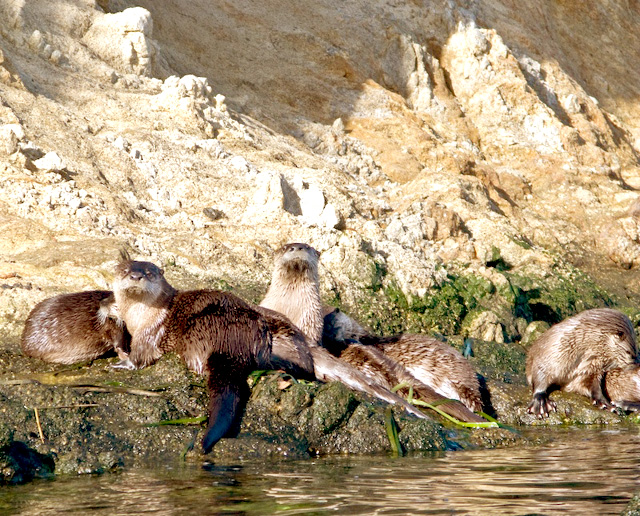
HSU professor Jeff Black is spearheading the innovative study on river otters, encouraging everyone from hikers and anglers, kayakers and surfers to join in what’s being dubbed “citizen science.” Through his research, he hopes to determine the health and population numbers of river otters in Humboldt and Del Norte counties. Through citizen science, anyone who spots otters in those areas can contribute simply by recording what they see and submitting it to Black. “We have parallel goals of education, outreach and science,” he says. “Everybody can participate and be part of this research network.”
Although this technique has been used before, this is the first time it’s been applied to river otters. “We have no one to compare our results to,” he says. “We’re one of the first in the country to do this kind of study.” According to Black, the otters’ elusive nature makes demographic studies rare. “It’s hit or miss,” he says. “But it’s the people who are out there all the time that will see them.”
In his 2009 article in the Northwestern Naturalist, Black explains that one successful study of Eurasian otters took 19 years of observing tracks in the snowy Finnish wilderness. Although he does a large percentage of the data collection himself, “opportunistic observation” serves as a valuable research tool. It allows citizens to supplement the database when he can’t be out wading through the marshes of Arcata himself.

To encourage involvement, Black created signs soliciting participation. Each sign has a list of questions about the otters’ behavior and information about how to submit the data. There are approximately 50 signs currently posted near various local waterways. To date, hundreds of citizen participants have contributed over 1,000 records.
Such a great effort is being made to learn more about the local river otter population because, according to Black, these data speak volumes about the ecosystem. By recording the health of the otter populations and their annual breeding, he hopes to find out more about the local environment. Unhealthy otter populations could mean danger.
“The top predators accumulate things in their tissues. If you’re at the top of the food chain, you have the most chances of aquiring toxins,” Black explains. Studying the effects of toxins on river otters is similar to studying the effects that DDT had on bald eagle populations. “If we didn’t have otters, then we’d know we were living in an overly polluted area,” he says. “We hope there will always be a healthy otter population here.” But the opportunities for researching river otters don’t stop there.
Right now, two graduate students are also conducting demographic studies on local river otters. Kristen Brzeski is studying DNA to determine if otter families living near each other are related. And Jen Terry is studying otter stress hormones to find out if certain waterways present more stressful living conditions than others.
Black’s research reaches other animals too. Presently, he is using the citizen science approach to track the fate of individual Steller’s jays, brant geese, Aleutian geese and the Canada geese using Humboldt Bay habitats. But he isn’t finished with otters just yet. “There is so much more to learn,” he says. Together with colleague Dr. Micaela Gunther, he is exploring reasons why river otters favor some habitats over others.
Although he has already collected several pieces of the puzzle, Black envisions the project lasting for many more years. “It’s an ongoing study. I’ll be working on it until I retire,” he says. “Then someone else will pick it up and keep it going.” And he’s not planning on retiring any time soon.
To submit otter sightings, contact Professor Jeff Black at otters@humboldt.edu or visit his website.